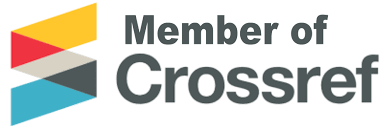Apakah Pendapatan Perempuan Dapat Mengurangi Kemiskinan? Bukti Data Panel di Indonesia
Abstract
Keywords
Full Text:
PDFReferences
Adnan, G. (2017). Gender mainstreaming in the contextof aceh development, Marwah: Jurnal Perempuan, Agama dan Jender, 16(2), 127-140
Amri, K. (2019). Pengaruh zakat dan kesempatan kerja terhadap tingkat kemiskinan di Aceh, Jurnal Al-Muzara’ah, 7 (2)
Amrizal, M. H., Wisadirana, D., & Kanto, S. (2016). Partisipasi Perempuan dalam Penanggulangan Kemiskinan pada Program Nasional Pemberdayaan Masyarakat Mandiri Perkotaan di Kabupaten Pasuruan (Studi Kasus di Desa Gajahbendo, Kecamatan Beji, Kabupaten Pasuruan), Jurnal Pamator, 9(2), 95-102.
Awan, A. G., & Sadia, R. F. (2018). Female participation in labor force and its impact on household and national income: Evidence from Pakistan, Global Journal of Management, Social Sciences and Humanities 4(4), 773-784.
Awumbilla, M. (2006). Gender equality and poverty in Ghana: implications for poverty reduction strategies, GeoJournal 67, 149-161
Brady, D. (2006). Structural theory and relative poverty in rich Western democracies, 1969–2000. Research in Social Stratification and Mobility, 24(2), 153–175. doi:10.1016/j.rssm.2005.02.004
Chen, Z., Wang, Z., & Jiang, H. (2019). Analyzing the heterogeneous impacts of high-speed rail entry on air travel in China: A hierarchical panel regression approach. Transportation Research Part A: Policy and Practice, 127, 86–98. doi:10.1016/j.tra.2019.07.004
Dixon, R. B. (1982). Women in Agriculture: Counting the Labor Force in Developing Countries. Population and Development Review, 8(3), 539. doi:10.2307/1972379
Haq, U., & Amin, A. (2014). The role of working women in poverty reduction (A case study of District Peshawar), The Dialogue, 12(2), 109-134
Harriet, T., Opuku-Asare, N. A., & Anin, E. K. (2014). The Role of Women in Reducing Household Poverty in the Bongo District of the Upper East Region, Ghana. Journal of Arts and Humanities, 3(4), 99-110.
Hastuti. (2014). Peran perempuan dalam pengentasan kemiskinan di desa wisata gabugan, Sleman, Daerah Istimewa Yogyakarta, SOCIA: Jurnal Ilmu-Ilmu Sosial, 11(2), 151-162
Hilal, R. (2012). Vocational education and training for women and youth in Palestine: Poverty reduction and gender equality under occupation. International Journal of Educational Development, 32(5), 686–695. doi:10.1016/j.ijedudev.2012.02.008.
Khan, S. (2013). Women's empowerment through poverty alleviation: a sociocultural and politico-economic assessment of conditions in Pakistan, International Journal of Academic Research and Reflection 1(1), 16-40
KPPPA (2016) Kajian Peran Perempuan Dalam Penanggulangan Kemiskinan Melalui Industri Rumahan, Kementerian Pem-berdayaan Perempuan dan Perlindungan Anak, Jakarta.
Meinzen-Dick, R., Quisumbing, A., Doss, C., & Theis, S. (2017). Women’s land rights as a pathway to poverty reduction: Framework and review of available evidence. Agricultural Systems. doi:10.1016/ j.agsy.2017.10.009.
Muliadi, M., & Amri, K. (2019). Penerimaan Zakat dan Penurunan Kemiskinan di Aceh: Peran Dana Otonomi Khusus Sebagai Pemoderasi, Jurnal Ilmiah Ekonomi Islam, 5(3), 231-242
Nieuwenhuis, R., van der Kolk, H., & Need, A. (2016). Women’s earnings and household inequality in OECD countries, 1973–2013. Acta Sociologica, 60(1), 3–20. doi:10.1177/0001699316654528.
Owusu, J., Akandasiam, A. C., & Anyesepari, A. A. (2013). Microfinance schemes and poverty reduction among women in the northern region of Ghana, International Journal of Humanities and Social Science 3 (19), 99-108.
Peraturan Presiden Republik Indonesia Nomor 15 Tahun 2010 Tentang Percepatan Penanggulangan Kemiskinan
Rustinsyah.(2018). Women empowerment for poverty reduction in ring-1 rural area of a cement company in Tuban, East Java Province, Indonesia. Masyarakat, Kebudayaan dan Politik, 31(1), 107-118.
Seebens, H. (2009). The contribution of female non-farm income to poverty reduction, International Association of Agricultural Economists Conference, Beijing, China, August 16-22, 2009.
Shin, K-Y. (2010). The effect of labor force participation by women on family income inequality in Korea, Japan, and Taiwan, Korean Social Science Journal, 27(1), 27-55.
Sultana, H. Y., Jamal, M. A., & E-Najaf, D. (2017) Impact of microfinance on women empowerment through poverty alleviation: an assessment of socio-economic conditions in chennai city of Tamil Nadu, Asian Journal For Poverty Studies, 3(2),175-183.
Tyerâ€Viola, L. A., & Cesario, S. K. (2010). Addressing poverty, education, and gender equality to improve the health of women worldwide. Journal of Obstetric, Gynecologic & Neonatal Nursing, 39(5), 580–589. doi:10.1111/j.1552-6909.2010. 01165.x.
Widiyanti, E., Pudjihardjo., & Saputra, P. M. A. (2018). Tackling poverty through women empowerment: The role of social capital in Indonesian women’s cooperative, Jurnal Ekonomi dan Studi Pembangunan, 10 (1), 44-55.
DOI: https://doi.org/10.35314/inovbiz.v8i1.1235
Refbacks
- There are currently no refbacks.
Copyright (c) 2020 Khairul - Amri

This work is licensed under a Creative Commons Attribution-NonCommercial-ShareAlike 4.0 International License.
This Journal has been listed and indexed in :
Copyright of Jurnal Inovasi Bisnis (p-ISSN : 2338-4840, e-ISSN : 2614-6983)

Inovbiz: Jurnal Inovasi Bisnis is licensed under a Creative Commons Attribution-NonCommercial-ShareAlike 4.0 International License.
Editorial Office :
Pusat Penelitian dan Pengabdian kepada Masyarakat
 Politeknik Negeri BengkalisÂ
Jl. Bathin alam, Sungai Alam Bengkalis-Riau 28711Â
E-mail: inovbiz@polbeng.ac.id














